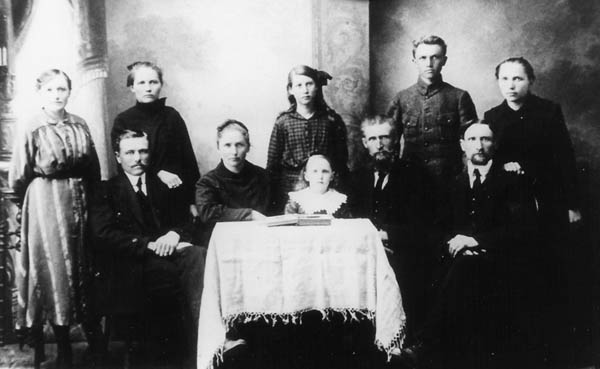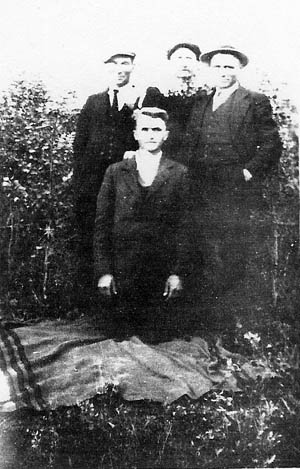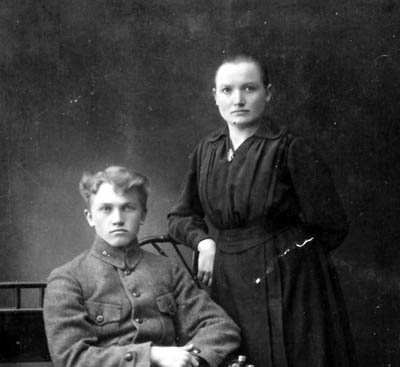 Index IndexPage |
 Previous Previoussection |
Section 4 |  Next Nextsection |
Outside influences, particularly political and general religious atmospheres, forced the family to make painful decisions in the following years. Even before Bolshevism took over in 1917, Russia had already experienced many years of political unrest. On November 3, 1914 a decree was published that prohibited the use of speaking in German, their mother tongue, in both the public assemblies and the press.
In 1915 they also passed strict liquidation laws in which some people overnight found themselves without land. During the years of political instability and civil wars, the parents were forced to house many soldiers overnight. The church in general - Lutheran, Baptist or Mennonite - played an important position in Soviet life. A great deal of constitutional legislation establishing the church on a strict ecclesiastical basis was passed in 1917 by the church council but most of it could not be put into action under the new Soviet regime.
While the M.B church was separated from the state under the provisional government, it was also persecuted. In the eyes of the law, the church had to be deprived of any and all means of being influential over national life with the intent of rebuilding national life on antireligious patterns.
The Russian Revolution, aka Bolshevism, dramatically altered the role the church played in community life. By 1917, Russia was facing major problems. Cold, hungry, demoralized by the war, the people were looking for a Savior. With the impending collapse of his country, under the severe pressure of revolutionary groups, Tsar Nicholas II abdicated his throne on March 2, 1917. When his brother, Michael, refused the crown, a provisional government was set up.
At this point, Lenin was determined to overthrow the government - a goal he achieved by October 25, 1917. Having embraced Marxist principles in 1889, he believed he could lead a backward Russia into a modern world. The goals of the Bolshevik Revolution were threefold:
- Create a paradise or utopia on earth where there was no injustice.
- Each worker would be a master in his own factory.
- Private property would be forbidden, thus paving the way for each citizen to share the wealth equally.
Churches were now prohibited from any educational activities i.e. private schools, seminaries etc. or any missionary expansion. In order to enforce this edict, the government destroyed churches and imposed heavy taxes on churches. They deported and executed both clergy and active laymen alike as they saw fit to change a strong vibrant church community into an irreligious body disrupting church administration.
Attempts were made to establish government sponsored churches competing with the historical church, but these attempts did not attract many believers. The government sponsored churches operating under names such as the Living Church, and the Renovated Church did not survive very long. One of the former bishops, Sergius of Gorki, was permitted to assume the leadership of the church but his movements were controlled by the government.
Without a doubt, the Mennonite churches known for their passive nature with regards to any military activity were not willing to bend under the governmental pressures and therefore had to be equally willing to suffer the consequences. They would not comply with the government sponsored church. It is under these conditions that the next chapter of the Wiens children unfolds.
Events moved fairly quickly now that affected the decisions made by many people. The aftermath of the revolution and war left Russia facing a terrible famine from 1921 to 1923 in which thousands of people died. The Mennonites sent four men to North America to search out possibilities of land and to plead their case with the Mennonite churches in Canada to help their hungry Russian brothers and sisters. The Mennonite Central Committee (MCC) was formed in 1920 to assist them in any way they could.
As a result of the revolution, war, famine and typhus, some 2,200 Mennonites died in Russia as it spread throughout the land. Peter third oldest sister, Margareta was one of the victims of typhus losing all of her hair in the course of the disease.
By 1925 things were very difficult politically. In 1918, Sara married a clergyman, Nicholai Pauls. One February, Peter's brother-in-law, Nicolai Pauls, a clergy, preached. That Sunday during their noon meal, the police broke into their home on the pretense of looking for guns. Finding no guns, with pistols facing him from either side, they forced Nicolai out into the yard to shoot him. God was at work and protected this young minister jamming the guns. They tried to shoot Nicolai again, and again God intervened on the Pauls behalf. The police, now very angry and frustrated, got back onto their horses and rode away. Nicolai went back into his home and told Sara that for their safety, it was time to move to Canada.
 |
| The Wiens Pauls Family 1925 Back row: Margaret, Justina Wiens Siemens, Tina, Peter and Sara Wiens Pauls Seated: Kornelius Siemens, Maria Eck Wiens Pauls, Njessa, Peter H. Pauls, and Nicholai Pauls |
| Peter with his brothers-in-law Approximately 1926-27 in Canada. Back row: John Enns, Nick Pauls, Kornelius Siemens Front Row: Peter Wiens |
 |
 |
| Peter (16) and Margaret (22) |
Peter and his sister, Margareta, still single but engaged to John Enns at this time, also wanted to go to Canada, but their parents didn't want to let them go because they were both so young. Peter was now 16 and approaching the military draft age. Even though the Mennonite young men were exempt from the draft, he wanted to leave while he still had the opportunity to do so and escape the unsettling military conditions.
To ease their parent's mind, Nick and Sara offered to sponsor them both and help them along as much as possible. Together with Nick and Sara, their four children, Heinrich, Maria, Peter and Nicolai, aged 1 thru 6, arrived on the shores of Quebec on June 6, 1925.
Their mother, Maria, wanted to emigrate with them as well, but her husband was not ready to make such a big decision, although he did help them financially. The parting of the Canada bound children from all family ties in Russia was sad. After much prayer, the parents let them go. The parents understood their need of Nick and Sara to leave because of the threats to Nick's life. From this time on until their departure, Nick was a marked man and could be taken away at any time. This group was among the first of the Mennonites to leave.
Between the years of 1922 to 1930, 25,000 Mennonites left Russia to escape the grip of spreading communism. Most of them (21,000) settled in Canada while the rest went to Paraguay, Brazil and Mexico. The last wave of immigrants did not happen until the years of 1941 thru 1943. This wave consisted of 35,000 participants, but only 12,000 successfully managed to reach other nations.
Whether they left or stayed was really a matter of conscience. Some of those who stayed were too comfortable in their ways and didn't see any real threat invading their lives while others felt that God had called the Mennonites to Russia for a purpose, and therefore for these, it was the will of God to stay.
Those who left felt that more than the loss of their military service exemption, which was honored until the late 1920's, was at stake. They would also lose their right to operate any undisturbed church activities, which included their own institutions caring for the sick, disabled and the old. They wanted the right to teach their children Christian values, as they saw fit, which was very important for the survival of the Mennonite church.
Two writers, Philipp Cornies and B.B. Janz, said it best in 1922 when they explained why so many people chose to leave Russia while they could at this time.
"In addition to motives already cited here, there are chiefly the ethical, moral and religious motives for considerations. There are persons with a deeper and clearer vision from all classes and all places of society, especially in the original colonies who are unable to make any compromises or begin any rebuilding because they have recognized that not only the economic, but also the social and moral foundation for such buildings are missing, which alone can be the determining factor for us. For the system of communistic influence, which is at present being carried out largely, and with disregard for our principles of freedom and religion, goes contrary to our ideals and can therefore not be accepted by us. Therefore it is impossible for us to stay here."
Perhaps the biggest reason Mr. Pauls, Peter's stepfather could not make the decision to leave was because he felt that things were not as bad as they seemed. On the contrary, things got progressively worse after 1925. Daughter Justina and her husband, Kornelius K. Siemens, their two children, Kornelius and Nellie, left in 1926. By the early 30's, the borders were closed and no one else was allowed out with very few being allowed to leave in the 40's.
When Peter's half sister, Njessa was ten years old, the remaining family left behind in Russia was forced to leave their home along with all of their possessions to go to a resettlement camp in Siberia. Their stepfather, Peter Pauls had been sent away once in 1929. In the summer of 1931 they were again relocated. Thus, this was the plight facing Mennonite families left behind for one reason or another.
Another story that was told as why their parents did not leave with the children when they could was because Mr. Pauls had been persuaded by another of his brothers to stay and that maybe he would still have time to leave later on. Perhaps his brother too, felt that there was no real threat facing them in staying. Either way, we will never know. Every effort was made on the part of Nick and Sara to bring them over but to no avail. Unfortunately, Mr. Pauls was taken away twice and disappeared for the final time in 1937. Before his final disappearance, men were already being taken from their villages and sent to the central part of Siberia to settle in the forests there.
One day all the men from the village that the Pauls' family lived in, failed to come home. Political security was so tight that when the women inquired about their husbands, they were simply told that if they asked for their husbands again, they would be taken to the same place. The police left only the women and children behind to fend for themselves. Maria Pauls was never the same after this and died on her 68th birthday on September 27, 1947. Her daughters, Tina and Njessa took care of her from that time on until her death.
Although they may been sent into Siberia, it is believed that all these men were placed in a box car and locked in. Gas was then poured over the car and light on fire burning the men alive. This was common in some cases.
Another story that goes about is that they were taken out and shot. Yet another possibility that happened was that he was thrown into prison and later died around 1943. At any rate they never saw their families again. Because of all the possibilities of what may have happened, the exact date of his death is not known.
With their husbands forcibly removed from the scene by the communists, a weak link was created in the homes of these women. They did not gain the freedom they expected. Every able bodied person was required to work - refusing to comply was considered a crime punishable by being imprisoned. Consequently the women were stretched beyond their limits and 'permanently exhausted' trying to mind not only the home and children but also pulling long hours in some factory or building railroads doing the jobs usually given to men.
There was a great deal of logic in the thinking of the communists to move in this direction. With the primary wage earners (the fathers) out of the way, the women, with absolutely no preparation, were forced to be both father and mother. They would now have their hands more than full causing the religious instruction of their children to suffer the most.
In this fashion, the government would be able to eliminate the influences of Christianity in the young. They could undermine the values of the family's Christian principles, weakening the impact of the church and thus paving the way for the next generation of young people to reject Christianity by filling that void with something more appealing. This generation would then become the founding foundation of an antireligious society which was important to the success of the establishing and survival of communism.
While Lenin's government guaranteed jobs, housing, food and health care which on the surface seemed good, it also had its adverse effects. One Russian citizen who survived this period said "we lost our past, our history, our religion and our moral values".
If the government did not like what one leader was doing, they would simply remove him, rewrite history the way they wanted their citizens to see it and erase the offending name from all history books. In this fashion both Stalin, and Khrushchev became classified as nonpersons as far they were concerned. They were treated as if they never existed. Current Russian history books indicate that there was no real recognized leadership after Lenin's death in 1925 until 1964 at which time Leonid I. Brezhnev was elected.
However, man's plan did not completely succeed as they forgot to reckon with the fact that God's power superceded the governments. The Bible tells us that the Lord foils the plans of nations and places hindrances and frustrations in the purposes of mankind (Psalms 33). Many years later visitors from Russia to Canada related to their hosts how fortunate they were that they could pray together around the table.
The only way that Russian believers could pray with their children was to go behind a large woolen blanket in a corner and whisper their prayers with their children. Neither were they allowed to talk about God with their families anywhere. Open prayer, Bible reading and attending church are just some of the privileges that people today simply take for granted when Russian believers were willing to pay the ultimate price for these privileges - loss of lives and property.
 Index IndexPage |
 Previous Previoussection |
Section 4 |  Next Nextsection |